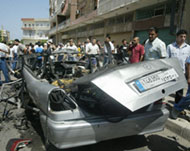Mossad terror suspect confesses
A Lebanese man has confessed to assassinating a number of senior members of Hezbollah and Palestinian armed groups over a seven-year period on behalf of Israeli intelligence.

The Lebanese army said on Tuesday that Mahmud Rafah, who was arrested along with three others last week in connection with the May 26 killing of two Islamic Jihad officials, was a leading member of a “terrorist” network behind at least three other major assassinations in Lebanon.
“Investigations by military intelligence showed that the terrorist network that was discovered had links to the Israeli Mossad for several years and that its members underwent training both inside Israel and outside,” the army statement said.
“The network was tasked by this agency with carrying out these operations and was given secret communication and monitoring devices for this purpose, along with detailed maps of the target … forged documents and bags with secret pockets.”
Israel has dismissed accusations it was behind the car bombing last month that killed Mahmud Majdhub, known as Abu Hamza, and his brother Nidal, both members of the Palestinian resistance group Islamic Jihad, in the southern Lebanese city of Sidon.
Several Palestinian and Hezbollah officials had been killed in Lebanon in recent years in attacks that their organisations had blamed on Israel, their neighbour and enemy.
Confession
Rafah admitted to the murder of Ali Hasan Dib, a Hezbollah official, in 1999 in the southern town of Arba, the killing of another Hezbollah official in Beirut in 2003 and the killing of Jihad Jibril, a Palestinian, in 2002, the army said.
|
“Investigations by military intelligence showed that the terrorist network that was discovered had links to the Israeli Mossad for several years and that its members underwent training both inside Israel and outside” |
Jibril, killed in a bombing aimed at his car in Beirut, was the son of Ahmed Jibril, head of the Damascus-based Popular Front for the Liberation of Palestine-General Command, a group opposed to Israel.
The army said Rafah had also confessed to planting other bombs that were either found and defused before they were detonated or missed their targets.
Syrian and Iranian-backed Hezbollah as well as Jibril welcomed the arrests in interviews with Hezbollah’s Al-Manar TV.
Emile Lahoud, the Lebanese president, said they proved that “Israel had not ceased its attempts to sabotage Lebanon”.
Footage
Television footage released by the Lebanese army showed equipment it said was used in the latest attack and discovered either at Rafah’s house in the Lebanese town of Hasbaya, on the border with Israel, or in a chalet that he used.
 |
|
Lebanon has been marred by |
The find included an Israeli camera that can be used to take detailed photographs of streets while concealed within a bag, forged driving licences and identity documents Rafah had received from Israel, the army said.
The footage also showed an air conditioning unit and a large speaker converted into secret cabinets that the army said were used to transport explosives used in the Sidon bombing.
Other finds included a television cabinet and a table fitted with secret drawers to conceal coded messaging devices.
The army said the attackers had used a car door packed with explosives before being smuggled from Israel, in the bombing that killed the two Islamic Jihad officials in Sidon.
The army is hunting a Palestinian man also believed to be part of the network, and those arrested will be taken to court, security sources said.